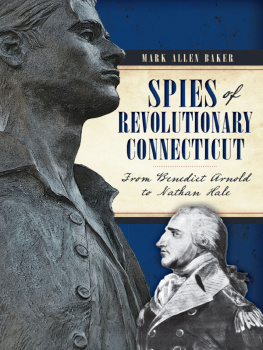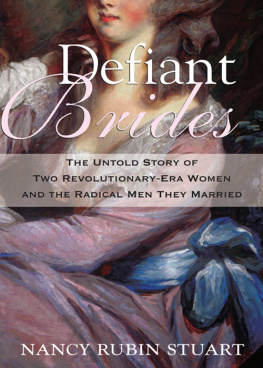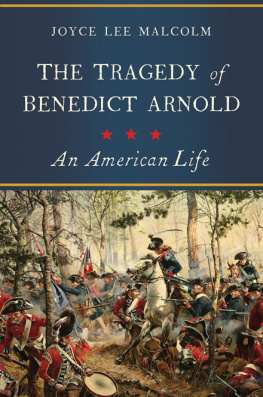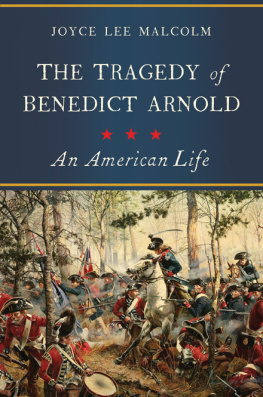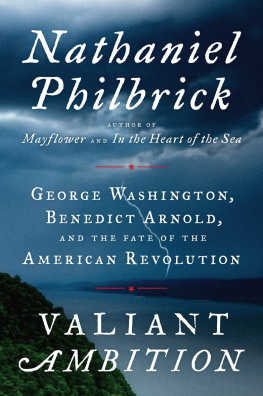Benedict Arnold
January 14, 1741

He was the sixth Benedict Arnold.
The first Benedict Arnold sailed from England to America in the early 1600s. He settled with his family in Newport, Rhode Island, became a wealthy landowner, and was elected governor of Rhode Island ten timesstill a record. His son, the second Benedict Arnold, mismanaged the familys estate and lost most of the money, though he did serve several terms in the colonys House of Deputies. The third Benedict Arnold was not elected to anything, as far as we know. He inherited just enough land for a modest farm, farmed badly, apprenticed his son to a barrel maker, and died poor.
Determined to turn the family fortunes around, the fourth Benedict Arnold learned to make barrels, moved to Norwich, Connecticut, and went to work for a prosperous merchant and sea captain named Absalom King. After King died suddenly of smallpox, Arnold married Kings widow, Hannah, and himself became a captain and successful merchant. Hannah gave birth to the fifth Benedict Arnold in 1738, but the child died of fever at just ten months. She had a second son on January 14, 1741. The boy was given the same name as his dead brother.
The Arnolds feared for their new baby. He was born right in the middle of one of the coldest months on record in the northeast, before or since. Early in January a mass of arctic air blew down from Canada and sat on coastal Connecticut, driving temperatures far below zero and holding them there for twenty days. Frozen snow covered fields and towns, silent roads, and abandoned wharfs. The streams froze, then the rivers, then, for the first time in local memory, shallow sections of ocean. Families huddled indoors, shivering when they stepped a few feet from the fireplace. It was a very bad time to be a newborn.
The sixth Benedict Arnold surprised everyone by surviving.
Pranks and Plays
17511762

Ten-year-old Benedict Arnold walked through the streets of Norwich with a sack of corn over his shoulder. He was on his way to the mill to have the corn ground into cornmeal.
When Benedict got to the mill, he saw a line of people ahead of him. This was not a boy who liked to wait. Reluctantly taking his place in line, he stood watching the rushing stream turn the mills huge wooden waterwheel. He looked again at the people in front of himimpatient boys and chatting adults: a perfect little audience.
Without a word, Benedict dropped his sack of corn, sprinted to the bank of the stream, and leaped through the air toward the spinning waterwheel. He slammed hard into the turning wheel, but managed to grab hold of one of the wet wooden spokes. Wrapping his body around the soggy wood, he rose high in the air, then swung upside down as the wheel turned, disappearing underwater. Seconds later he burst up with the wheel, dripping and smiling.
As he rose for another spin, he turned toward the line of people outside the mill. The boys grinned with admiration; the adults were in shock. The best part: they were all looking at him.
The people of Norwich soon got used to this kind of behavior. One local resident remembered young Benedict Arnold as a daredevil. Another, an early teacher, called him a bright boy, so full of pranks and plays.
Locals described Benedict as lean and strong, always carefully dressed in fine clothes. When not stuck in school or church, Benedict could be seen running or swimming, or sailing small boats, or jumping onto ships at the wharf and wriggling up the tallest masts just for the joy of the challenge. If the ships captain came out to curse him, hed dive off into the river and swim to a safe distance. He was a thrill seeker, a natural athlete, a born show-off.
When Benedict was eleven years old, his parents sent him to a respected boarding school in the nearby town of Canterbury. There his troubles began.

In August 1753, Benedict opened a letter from his mother, Hannah. He was expecting routine news about his father and his three younger sisters: Hannah, Mary, and Elizabeth. Instead he read: Deaths are multiplying all round us, and more daily expected, and how soon our time will come, we know not.
An epidemic of yellow fever was ripping through Norwich, and Benedicts sisters all had the telltale chills and yellow eyes. Benedict wanted to rush home to be with his family, but his mother refused to let him comenot while the deadly fever was still spreading. So he stayed at school, helplessly waiting for news.





